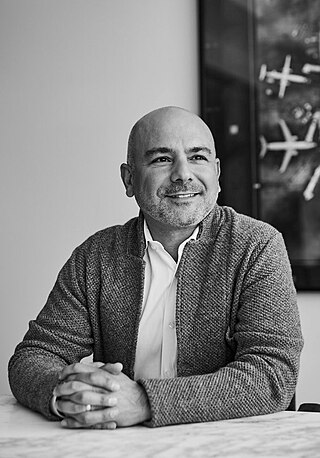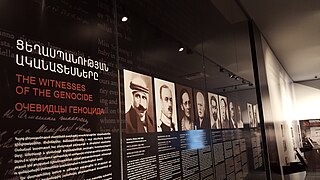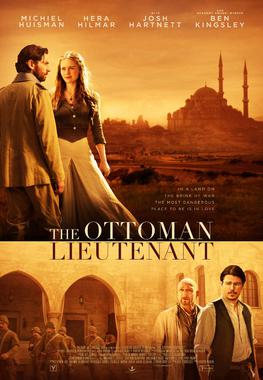| Intent to Destroy | |
|---|---|
 | |
| Directed by | Joe Berlinger |
| Written by |
|
| Produced by |
|
| Music by | Serj Tankian |
| Distributed by | Abramorama |
Intent to Destroy: Death, Denial, & Depiction is a 2017 documentary film directed by Joe Berlinger about the Armenian genocide.
| Intent to Destroy | |
|---|---|
 | |
| Directed by | Joe Berlinger |
| Written by |
|
| Produced by |
|
| Music by | Serj Tankian |
| Distributed by | Abramorama |
Intent to Destroy: Death, Denial, & Depiction is a 2017 documentary film directed by Joe Berlinger about the Armenian genocide.
Berlinger embedded in the filming crew of The Promise to shoot Intent to Destroy. [1] The film prominently features behind the scenes footage from The Promise, starring Oscar Isaac and Christian Bale, while incorporating historical context for the feature film. [2]
According to The Promise actor Daniel Giménez-Cacho, an ambassador in the Turkish foreign service had contacted him and told him the Turkish government's position that the killings in the Armenian genocide were not a genocide; his statements were featured in Intent to Destroy. [1]
Berlinger declined an invitation to travel to Ankara, Turkey to interview officials of the Turkish government. The interview request appeared after, according to him, he requested feedback from the Turkish government. Turkish officials did not say who he would meet, and had he gone, he would not have been allowed to bring his film crew nor any recording devices. Berlinger stated "I felt like it would be a useless trip and one that was potentially dangerous, frankly." [1]
Among the experts interviewed were Taner Akçam, Fatma Müge Göçek, and Vicken Cheterian. The film also interviewed Turkish officials who denied that an Armenian Genocide had occurred. [3]
Los Angeles Times described the film as a "masterful effort." [4] It earned a "Critic Score" of 92% on Rotten Tomatoes. [5]
Frank Scheck of The Hollywood Reporter stated that it was "excellent and informative", though he argued that at times the film "plays like a special feature for the DVD edition of The Promise", an aspect he was critical of. [6]
Historian Ronald Grigor Suny compared the film favorably to The Promise , stating, "Berlinger selects from The Promise precisely those scenes that show the horrors of 1915... Watching the crew paint the extras with simulated blood and the reaction of the lead actors to the scene (some of whom break down and sob) is oddly more evocative of the terrors of that time than that same scene" in The Promise. He also praised the film for its use of varied source material and expressed that film may be a better medium for capturing the horrors of genocide than written text, stating, "What on the printed page can possibly match the panoramic view, shot from above by a camera mounted on a drone, of a column of desperate, bereft Armenians marching to their death?" [3]
After its theatrical run, Intent to Destroy was acquired by Starz for television. [7] Intent to Destroy was nominated for an Emmy for Outstanding Historical Documentary at the 40th News and Documentary Emmy Awards. [8]

The Armenian genocide was the systematic destruction of the Armenian people and identity in the Ottoman Empire during World War I. Spearheaded by the ruling Committee of Union and Progress (CUP), it was implemented primarily through the mass murder of around one million Armenians during death marches to the Syrian Desert and the forced Islamization of others, primarily women and children.

The Adana massacres occurred in the Adana Vilayet of the Ottoman Empire in April of 1909. Many Armenians were slain by Ottoman Muslims in the city of Adana as the Ottoman countercoup of 1909 triggered a series of pogroms throughout the province. Around 20,000 to 25,000 ethnic Armenians were killed and tortured in Adana and surrounding towns, it was reported that about 1,300 Assyrians were also killed during the massacres. Unlike the previous Hamidian massacres, the events were not officially organized by the central government, but culturally instigated via local officials, Islamic clerics, and supporters of the Committee of Union and Progress (CUP).

Joseph Berlinger is an American documentary filmmaker and producer. Particularly focused on true crime documentaries, Berlinger's films and docu-series draw attention to social justice issues in the US and abroad in such films as Brother's Keeper, Paradise Lost: The Child Murders at Robin Hood Hills, Crude, Whitey: United States of America v. James J. Bulger and Intent To Destroy: Death, Denial and Depiction.

Peter Balakian is an American poet, prose writer, and scholar. He is the author of many books including the 2016 Pulitzer prize winning book of poems Ozone Journal, the memoir Black Dog of Fate, winner of the PEN/Albrand award in 1998 and The Burning Tigris: The Armenian Genocide and America's Response, winner of the 2005 Raphael Lemkin Prize and a New York Times best seller. Both prose books were New York Times Notable Books. Since 1980 he has taught at Colgate University where he is the Donald M and Constance H Rebar Professor of the Humanities in the department of English and Director of Creative Writing.
Justin A. McCarthy is an American demographer, former professor of history at the University of Louisville, in Louisville, Kentucky. He holds an honorary doctorate from Boğaziçi University (Turkey), was awarded the Order of Merit of Turkey, and is a board member of the Institute of Turkish Studies and the Center for Eurasian Studies (AVIM). His area of expertise is the history of the late Ottoman Empire.

Armenian genocide denial is the negationist claim that the Ottoman Empire and its ruling party, the Committee of Union and Progress (CUP), did not commit genocide against its Armenian citizens during World War I—a crime documented in a large body of evidence and affirmed by the vast majority of scholars. The perpetrators denied the genocide as they carried it out, claiming that Armenians in the Ottoman Empire were resettled for military reasons, not exterminated. In its aftermath, incriminating documents were systematically destroyed. Denial has been the policy of every government of the Ottoman Empire's successor state, the Republic of Turkey, as of 2024.

The Urfa resistance was an effort by some Ottoman Armenians in Urfa to defend themselves against the Armenian genocide launched by the Ottoman Empire. The resistance was quelled following German intervention.

Ara Sarafian is a British historian of Armenian origin. He is the founding director of the Gomidas Institute in London, which sponsors and carries out research and publishes books on modern Armenian and regional studies.

Ronald Grigor Suny is an American-Armenian historian and political scientist. Suny is the William H. Sewell Jr. Distinguished University Professor of History Emeritus at the University of Michigan and served as director of the Eisenberg Institute for Historical Studies, 2009 to 2012 and was the Charles Tilly Collegiate Professor of Social and Political History at the University of Michigan from 2005 to 2015, William H. Sewell Jr. Distinguished University Professor of History (2015–2022), and is Emeritus Professor of political science and history at the University of Chicago.
Dale "Chip" Rosenbloom is an American filmmaker and composer, known for the films Shiloh, Across the Tracks, and Fuel as well as the musical Bronco Billy. He has produced over thirty films and television movies. He is president of Rosenbloom Entertainment and founder/owner of Open Pictures. He was formerly the co-owner and vice chairman of the Los Angeles Rams professional football franchise.
Joseph Porter Ruben is an American retired filmmaker.

Eric Esrailian is an American physician at the David Geffen School of Medicine at the University of California, Los Angeles (UCLA). He is also an Emmy-nominated film producer and is active in charity and community service activities in Los Angeles.

Ra's al-'Ayn camps were desert death camps near the city of Ras al-Ayn, where many Armenians were deported and slaughtered during the Armenian genocide. The site became "synonymous with Armenian suffering".
Armenian genocide in culture includes the ways in which people have represented the Armenian genocide of 1915 in art, literature, music, and films. Furthermore, there are dozens of Armenian genocide memorials around the world. According to historian Margaret Lavinia Anderson, the Armenian genocide had reached an "iconic status" as "the apex of horrors conceivable" prior to World War II.

Witnesses and testimony provide an important and valuable insight into the events which occurred both during and after the Armenian genocide. The Armenian genocide was prepared and carried out by the Ottoman government in 1915 as well as in the following years. As a result of the genocide, as many as 1.5 million Armenians who were living in their ancestral homeland were deported and murdered.

The Promise is a 2016 American epic historical war drama film directed by Terry George, from a screenplay he co-wrote with Robin Swicord. Set in the final years of the Ottoman Empire, the film stars Oscar Isaac, Charlotte Le Bon and Christian Bale. The plot is about a love triangle that develops between Mikael (Isaac), an Armenian medical student, Chris (Bale), an American journalist, and Ana, an Armenian-born woman raised in France, immediately before and during the Armenian genocide.

The Ottoman Lieutenant is a Turkish-American romantic war drama film directed by Joseph Ruben and written by Jeff Stockwell. The film stars Michiel Huisman, Hera Hilmar, Josh Hartnett and Ben Kingsley. The film was released widely on March 10, 2017.

"They Can Live in the Desert but Nowhere Else": A History of the Armenian Genocide is a book by Ronald Grigor Suny about the Armenian genocide, published by Princeton University Press in 2015. The book was praised as an accessible work that provides the academic consensus on why and how the Armenian genocide occurred.
The terminology of the Armenian genocide is different in English, Turkish, and Armenian languages and has led to political controversies around the issue of Armenian genocide denial and Armenian genocide recognition. Although the majority of historians writing in English use the word "genocide", other terms exist.

Differing views of what caused the Armenian genocide include explanations focusing on nationalism, religion, and wartime radicalization and continue to be debated among scholars. In the twenty-first century, focus has shifted to multicausal explanations. Most historians agree that the genocide was not premeditated before World War I, but the role of contingency, ideology, and long-term structural factors in causing the genocide continues to be discussed.